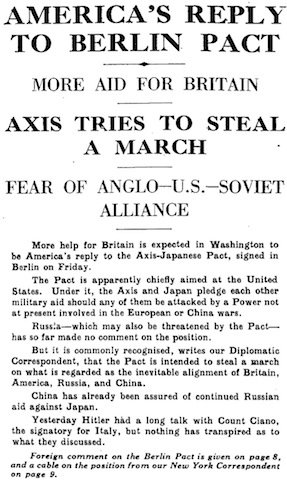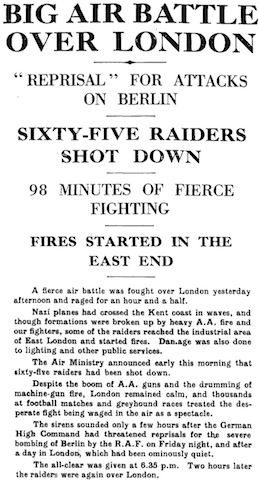
Friday witnessed the signing of the ‘Axis-Japanese Pact’ in Berlin. The Observer‘s diplomatic correspondent believes the pact is ‘chiefly aimed at the United States’, and ‘is intended to steal a march on what is regarded as the inevitable alignment of Britain, America, Russia, and China’ (7):
Under it, the Axis and Japan pledge each other military aid should any of them be attacked by a Power not at present involved in the European or China wars.
The belief that America will eventually enter the war is a common one (and reflected here by the claim that the likely American response to the pact will be to step up aid to Britain). But I’m surprised to see Russia being thought of in the same way; it’s not so long ago that British men were volunteering to help defend Finland against the Red Army.
Friday was also a day of heavy ‘air fighting’, and yesterday the Prime Minister sent the following message to the Air Minister:
Pray, congratulate the Fighter Command on the result of yesterday. The scale and intensity of the fighting and the heavy losses of the enemy, especially in relation to our own make September 27 rank with September 15 and August 15 as the third great and victorious day of the Fighter Command during the course of the Battle of Britain.
A ‘big aerial battle’ took place over the ‘South-East outskirts of London’ yesterday, but it seems little damage was done as the bombers were ‘heavily engaged by British fighters’. Liverpool and ‘widely scattered areas in the North West’ were raided on Friday night, though little damage was done. The Observer doesn’t seem to say if London was attacked too, though after three weeks of nightly air raids it would be more newsworthy if it wasn’t bombed.
The Observer approves of the appointment of Henry Willink (and his ‘despotic hands’) as special commissioner for London’s homeless, after the idleness of the ‘multiple authorities’ during the first part of the war (6). There is much to be done;
For the many crowded localities of east and south London with their insubstantial dwellings refuges wide and deep are needed.
Shelter conditions must be improved too, and
Discipline must be enforced upon their more irresponsible occupants, in the interests of the tranquil majority.
J. L. Garvin makes similar points in his own column, noting that it must be assumed that the war will be a long one and that the coming winter ‘will be the sternest winter that London and Britain have ever known’. But he points out the need to prepare ‘not only for impregnable defence, but for its sequel of conquering attack’. This will involve providing the army and the navy with the necessary weapons; but ‘above all, salvation and triumph in this struggle, whatever its length, will depend on the expansion of the R.A.F.’ (which in turn will depend on American aircraft production and the training of Empire pilots in Canada).
For ourselves and civilisation the only way of social deliverance from German air-terrorism is to bomb it down in the Reich. The sooner we wield air-mastery in quantity as in quality the shorter the war.
Oliver Stewart, air correspondent, is of like mind. But he argues that the British people need to support the RAF not just by giving it the aeroplanes and bombs it needs but also by holding fast under fire, ‘which frees it to go all out in counter-attack’ (7). That is to say, by attacking military objectives in Germany rather than civilian ones — i.e. reprisals, though interestingly Stewart does not use this word. He does admit that
However careful the aim, attack on military objectives sometimes entails civilian casualties, because civilians frequently live in clusters around aircraft and munitions works. Civilian casualties in Britain are probably higher than in Germany, and especially in London than in Berlin. But London is much bigger than Berlin, a thing that, in some respects, tends to redress the balance.
Stewart says that ‘Four-engined aeroplanes’ have ‘occasionally’ been used to bomb London, though mostly the attacks are carried out by He 111s and Do 215s. The Luftwaffe appears to be using ‘increasing numbers of the small Heinkel 113’ fighter. Incidentally, he also comments on the phrase ‘aerial torpedo’, which sometimes crops up in civilian accounts of bombing.
By this term I understand a parallel to the sea torpedo, namely, a gliding bomb. Many people seem to describe any exceptionally large bomb as an aerial torpedo.
There’s no ‘conclusive evidence’ of the former being used by the Germans, and the latter is (I infer) inaccurate and unnecessary.
Finally, for those who are inclined to turn to the Church for guidance in this hour of need, here is some advice from the Bishop of Winchester, Dr Cyril Garbett:
“Decide what you will do during a raid warning,” he writes. “To do nothing is bad for the nerves. Have ready some work or book — a thriller — some game, special records for the gramophone, crossword puzzle, or anything to occupy the mind.
“If you have a disturbed night go to bed in the day. When you go to bed commit yourself into God’s keeping.”
He also has words for clergy who are ‘absent from their parishes during a raid’. Apparently some are trekking to safer locations rather than staying put and tending to their flocks. The Bishop ‘strongly disapprove[s]’ of this practice.
![]() This work is licensed under a Creative Commons Attribution-NonCommercial-NoDerivatives 4.0 International License.
Permissions beyond the scope of this license may be available at http://airminded.org/copyright/.
This work is licensed under a Creative Commons Attribution-NonCommercial-NoDerivatives 4.0 International License.
Permissions beyond the scope of this license may be available at http://airminded.org/copyright/.





